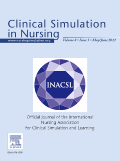
Clinical Simulation in Nursing
Scope & Guideline
Fostering excellence in nursing education and practice.
Introduction
Aims and Scopes
- Simulation-Based Learning:
Focuses on various simulation methodologies, including high-fidelity, low-fidelity, and virtual simulations, to prepare nursing students for real-life clinical scenarios. - Interprofessional Education:
Promotes collaborative learning experiences among nursing and other health professions, fostering teamwork and communication skills essential for patient care. - Psychometric Evaluation:
Involves assessing the effectiveness of simulation tools and educational strategies through robust psychometric testing and evaluation methodologies. - Cultural Competence and Sensitivity:
Addresses the need for culturally sensitive care in nursing education by incorporating diversity, equity, and inclusion themes into simulation scenarios. - Technology Integration:
Explores the use of advanced technologies, such as virtual reality, augmented reality, and artificial intelligence, to enhance the realism and effectiveness of simulation training. - Debriefing and Reflection:
Focuses on the importance of effective debriefing practices post-simulation to enhance learning outcomes and foster critical thinking among students. - Clinical Judgment and Decision-Making:
Investigates how simulation can improve clinical reasoning and decision-making skills, crucial for nursing practice.
Trending and Emerging
- Virtual and Augmented Reality Simulations:
There is a rising trend in the use of virtual and augmented reality technologies in simulation, providing immersive learning experiences that enhance student engagement and clinical skills. - Mental Health and Emotional Competence:
An increased focus on mental health simulations and emotional competence training underscores the importance of addressing psychological aspects of patient care. - Interprofessional Collaboration:
The integration of interprofessional education in simulation scenarios is gaining momentum, emphasizing teamwork and communication across various health disciplines. - Simulation for Cultural Competence:
Emerging themes include the use of simulation to teach cultural humility and sensitivity, preparing nursing students to care for diverse populations effectively. - Use of Artificial Intelligence:
The exploration of AI-driven simulation tools is becoming more prevalent, offering personalized learning experiences and real-time feedback during training. - Focus on Psychological Safety:
A growing emphasis on creating psychologically safe learning environments during simulations has emerged, highlighting the importance of student well-being and open communication. - Debriefing Innovations:
Innovative approaches to debriefing, including asynchronous and peer-led models, are being explored to enhance reflection and learning outcomes post-simulation.
Declining or Waning
- Traditional Assessment Methods:
There is a noticeable decrease in studies focused on traditional assessment techniques, such as written exams, as simulation-based assessments gain prominence. - Static Simulation Techniques:
The focus on static or non-interactive simulation methods is waning, with a shift towards more dynamic, immersive experiences that engage learners actively. - Basic Skills Training:
Interest in basic skills training through simulation appears to be declining as the emphasis shifts towards complex, scenario-based learning that better reflects real-world nursing challenges. - Single-Discipline Focus:
Research centered solely on nursing without interprofessional collaboration is becoming less common, as the field increasingly values multidisciplinary approaches. - In-Person Simulation Exclusivity:
The reliance on in-person simulation experiences is diminishing, with a growing acceptance and integration of virtual and hybrid simulation models.
Similar Journals

Nursing Open
Championing evidence-based practice in nursing.Nursing Open is a premier open access journal published by WILEY, dedicated to advancing the field of nursing and healthcare research. With its ISSN 2054-1058, this journal has been at the forefront of disseminating innovative and impactful research since its inception in 2014. As an open access platform, it ensures that knowledge is accessible to all, promoting collaboration and engagement among researchers, practitioners, and students. Hailing from the United States and located at 111 River St, Hoboken, NJ 07030, Nursing Open has established itself as a vital resource in the nursing discipline, reflected in its impressive Q1 ranking in the 2023 category of Nursing (miscellaneous) and Scopus ranking of #36 out of 139 in General Nursing, placing it in the 74th percentile. With a commitment to high-quality research and a focus on contemporary issues in nursing, this journal invites contributions that foster evidence-based practice and enrich the global nursing community.
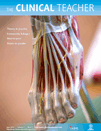
Clinical Teacher
Inspiring Excellence in Clinical EducationThe Clinical Teacher is a leading journal published by WILEY, dedicated to fostering excellence in medical education and enhancing the skills of healthcare educators. With an ISSN of 1743-4971 and an E-ISSN of 1743-498X, this esteemed publication has gained recognition for its practical insights and innovative approaches, particularly in the realms of Teaching and Assessment within the medical field. Since its inception in 2006, it has maintained a notable impact within its categories, ranking Q3 in Medicine (miscellaneous) and an impressive Q1 in Review and Exam Preparation as of 2023. The journal's commitment to advancing educational practices is reflected in its exceptional Scopus ranking of #1 in the Nursing Review and Exam Preparation category, placing it in the 87th percentile of its peers. Although not open access, The Clinical Teacher serves as an invaluable resource for researchers, educators, and healthcare professionals focused on improving the learning experiences of future medical practitioners. With continued contributions from eminent figures in the field, this journal stands as a vital platform for the dissemination of knowledge and the evolution of teaching methodologies in clinical settings.
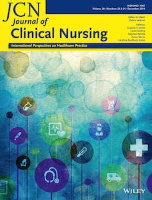
JOURNAL OF CLINICAL NURSING
Exploring the forefront of nursing research and practice.The JOURNAL OF CLINICAL NURSING, published by WILEY, stands as a prestigious platform within the realm of nursing and medical research in the United Kingdom. With an ISSN of 0962-1067 and an E-ISSN of 1365-2702, this journal has been a cornerstone of scholarly communication since its inception in 1992. Spanning a comprehensive scope of clinical nursing practices and innovations, it consistently ranks in the first quartile (Q1) according to the latest metrics in both the disciplines of nursing and general medicine. The journal holds a commendable Scopus ranking of 8th out of 139 journals in General Nursing, placing it within the 94th percentile, which underscores its importance and influence in the academic community. Although it does not currently offer Open Access options, the JOURNAL OF CLINICAL NURSING provides an invaluable resource for researchers, healthcare professionals, and students, aiming to enhance clinical practices and address contemporary challenges within the field of nursing.
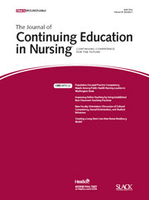
JOURNAL OF CONTINUING EDUCATION IN NURSING
Cultivating Expertise in Nursing Through Continuing Education.JOURNAL OF CONTINUING EDUCATION IN NURSING, published by SLACK INC, is an esteemed journal dedicated to the field of nursing education and professional development. Since its inception in 1970, it has actively contributed to the growth of nursing knowledge and practice, making it an essential resource for educators, practitioners, and researchers alike. The journal holds a solid standing with an impact factor reflecting its importance, categorized as Q2 in Nursing (Miscellaneous) and Review and Exam Preparation, and Q3 in Education according to the 2023 rankings. With a mission to support ongoing education among nursing professionals, it provides a platform for innovative research, evidence-based practices, and comprehensive reviews that enhance nursing education. The journal is accessible in print and does not currently offer open access options, ensuring exclusivity in its high-caliber content. As it converges into 2024, the JOURNAL OF CONTINUING EDUCATION IN NURSING remains pivotal in shaping the future of nursing education and facilitating professional excellence.
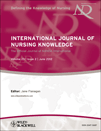
International Journal of Nursing Knowledge
Advancing nursing scholarship for a better tomorrow.The International Journal of Nursing Knowledge, published by WILEY, stands as a leading platform for advancing nursing scholarship, offering critical insights in both fundamentals and innovative research within the nursing field. With an ISSN of 2047-3087 and an E-ISSN of 2047-3095, this journal has garnered an impressive reputation, frequently ranking in the Q1 and Q2 quartiles across pivotal areas such as Fundamentals and Skills, and Research and Theory, respectively. Notably, it holds a Scopus rank of #5 in Nursing Fundamentals and Skills and #8 in Nursing Research and Theory, reflecting its high impact and relevance in shaping nursing education and practice. Since its inception in 2012, the journal has been devoted to fostering scholarly communication and knowledge across the nursing discipline, complementing both research and practical know-how. The journal is also aligned with open access principles, ensuring that cutting-edge nursing knowledge is accessible to a broad audience. With a commitment to rigor and excellence, the International Journal of Nursing Knowledge serves as an essential resource for nursing professionals, researchers, and students alike, dedicated to enhancing patient care through evidence-based practice.
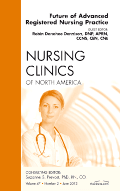
NURSING CLINICS OF NORTH AMERICA
Connecting practitioners to essential nursing advancements.Nursing Clinics of North America is a premier peer-reviewed journal published by W B Saunders Co - Elsevier Inc, providing a vital platform for the dissemination of innovative research and clinical practice insights in the field of nursing and medicine. With an impressive impact factor reflecting its relevance in academic circles, this journal falls within the Q2 category in both Medicine and Nursing disciplines, showcasing its importance to professionals and researchers. Established in 1966 and continuing through to 2024, it offers valuable contributions across a wide array of topics, facilitated by its Scopus rank of #41 in General Nursing and a 70th percentile ranking, marking it as one of the leading publications in the field. Although not an open-access journal, it provides subscription-based access to critical information that supports advancing nursing knowledge and practices. The journal is dedicated to enhancing the skills and understanding of nurses, healthcare professionals, and students, making it an essential resource for those seeking to excel in nursing and allied health professions.
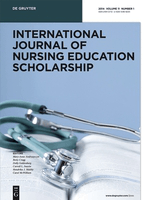
International Journal of Nursing Education Scholarship
Transforming healthcare through evidence-based nursing education.International Journal of Nursing Education Scholarship is a crucial academic platform dedicated to advancing the field of nursing education through rigorous research and scholarship. Published by WALTER DE GRUYTER GMBH in Germany, this journal serves as a key resource for researchers, educators, and practitioners in nursing and related educational fields. With an impressive impact factor and a strong Scopus ranking, notably Rank #44 in General Nursing, the journal occupies a respected position within the Q2 category in both the Education and Nursing sectors. Its open access policy enhances the dissemination of critical findings, facilitating broader access to high-quality nursing education research. Spanning from 2003 to 2025, this publication is committed to fostering innovation and excellence in nursing education, promoting evidence-based practices that ultimately benefit healthcare systems worldwide. As a vital resource for academia and practice, International Journal of Nursing Education Scholarship continuously encourages the discourse on best practices and emerging trends in nursing education.
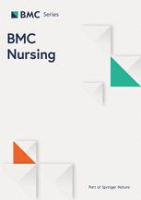
BMC NURSING
Empowering Nursing Innovation for a Healthier TomorrowBMC Nursing is a premier open-access journal dedicated to the field of nursing, published by BMC in the United Kingdom. With its ISSN 1472-6955, this journal has been a vital resource for nursing professionals, researchers, and students since its establishment in 2002. Recognized among the top journals in its category, BMC Nursing enjoys a commendable Q1 quartile ranking in 2023 and is positioned at #34 out of 139 in the general nursing category on Scopus, highlighting its significant impact on the nursing discipline with a 75th percentile ranking. The journal aims to disseminate high-quality research articles that promote evidence-based practices and improve patient care outcomes, catering to a diverse global audience. With an emphasis on innovative nursing practices and interdisciplinary collaboration, BMC Nursing invites contributions that advance the understanding of patient care, nursing education, and health policy. As an open-access journal, it ensures that cutting-edge research is readily accessible to all, fostering an environment of knowledge sharing and collaboration within the nursing community.

International Journal of Nursing Sciences
Unlocking Insights for Nursing ProfessionalsThe International Journal of Nursing Sciences, published by Elsevier since 2014, stands as a leading open access platform in the nursing field, notably categorized in the Q1 quartile for Nursing (Miscellaneous) in 2023, which reflects its exceptional quality and impact. With an impressive Scopus rank of #11 out of 139 in General Nursing, this journal is vital for researchers, professionals, and students eager to explore innovative nursing practices and scientific advancements. Its commitment to disseminating high-quality research fosters knowledge sharing and collaboration, making it an indispensable resource for those dedicated to improving healthcare outcomes. Based in China, the journal aims to bridge gaps in nursing science globally, ensuring comprehensive access to critical studies and reviews that shape the future of nursing. Access options allow for unrestricted reading and sharing of research articles, emphasizing the journal's dedication to advancing nursing leadership and education worldwide.
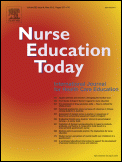
NURSE EDUCATION TODAY
Driving Change in Nursing Education Through Critical Discourse.NURSE EDUCATION TODAY is a prestigious academic journal dedicated to advancing the field of nursing education and practice. Published by Churchill Livingstone in the United Kingdom, this journal has been a vital resource since its inception in 1981, with a commitment to improving the standards and methodologies in nursing training. As evidenced by its impressive Q1 ranking in both Education and Nursing categories in 2023, and a remarkable 96th percentile ranking in Nursing (General Nursing), NURSE EDUCATION TODAY stands out as a leading source of evidence-based research, innovative educational strategies, and critical discussions that shape the future of nursing education. The journal provides a platform for researchers, practitioners, and educators to share their findings and experiences, making it essential reading for all stakeholders in the healthcare education landscape. Although it does not offer Open Access, its substantial impact on the nursing education community is significant, with ongoing contributions up to 2024 and beyond.